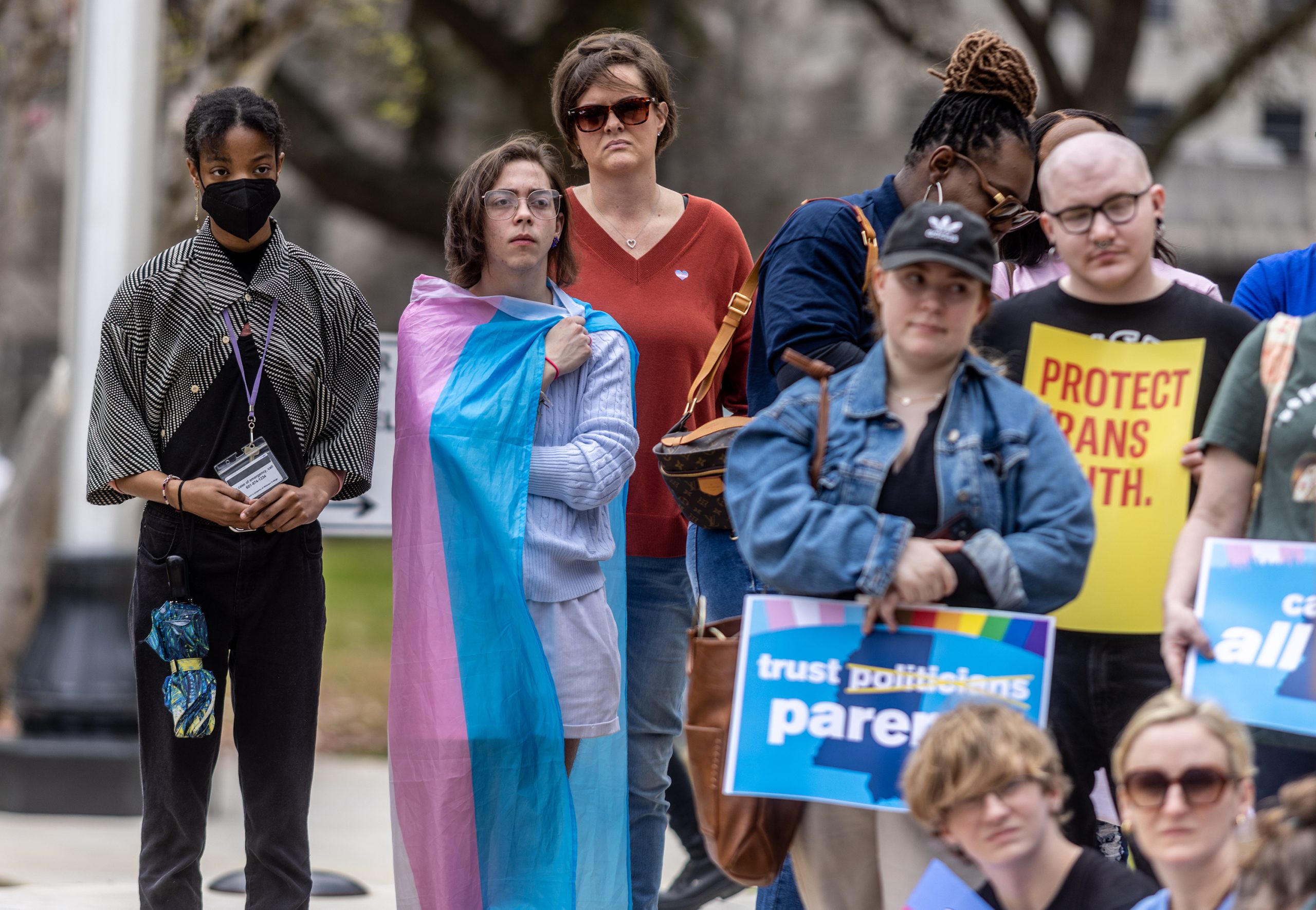Mississippi Today
Mississippi Medicaid spent a tiny fraction of its budget on gender-affirming care before lawmakers banned it

Mississippi Medicaid spent a tiny fraction of its budget on gender-affirming care before lawmakers banned it
The Mississippi Division of Medicaid spent months working to determine how much it paid in claims associated with gender identity disorder or gender dysphoria following an anonymous legislative request, according to emails obtained through a public records request.
The answer: A maximum of $58,900.82 in taxpayer money over the last five years from the agency's annual budget of $6 billion – nearly half of which paid for a mastectomy to treat a “life-threatening disease” that was not gender dysphoria. No money was paid to providers for intersex surgery for trans men or trans women.
Attorneys for Medicaid initially miscalculated the answer, but after many back and forths over email with a representative from a legislative committee, landed on this imperfect estimate.
It is unclear from the documents how much Medicaid paid in reimbursements specifically for gender-affirming care for trans youth. It is also unclear which procedures are directly related to gender-affirming care. Some include descriptions of routine medical claims such as emergency room visits and lipid panels. Only one reimbursement could be more easily connected to gender-affirming care for trans children: $94.20 for “bone age studies.”
In a letter to Mississippi Today, Medicaid noted that some claims “may not be directed related to” services for a patient's primary diagnosis of gender dysphoria.
The Division of Medicaid did not answer questions from Mississippi Today for this story.
Earlier this year, Medicaid became the first state agency to take a public position on gender-affirming care for trans children as lawmakers sought to ban it. In mid-February, Executive Director Drew Snyder sent a letter stating that there is not enough medical literature to support that it is a “safe and effective treatment for gender dysphoria” for trans youth.
Snyder's letter did not mention Medicaid reimbursements for gender-affirming care.
Rob Hill, the state director of Human Rights Campaign of Mississippi, said that Snyder's letter contradicts Medicaid's past actions of paying for gender-affirming care. Despite Medicaid's letter, major medical associations support gender-affirming care for trans youth.
“I've always known Drew Snyder to be a fair-minded person, so I would say I was really disappointed to see this letter released that was not based on fact,” Hill said. “There is plenty of research that he or his folks in the department could've done. It's easily found on the internet. I could have sent him a fact sheet.”
For trans people, it can be challenging to get gender-affirming care covered by private health insurance. Trans people report being uninsured at a rate seven times higher than cis people, due in significant part to job discrimination and the employment-based health insurance model in the U.S., according to a report from the Center for American Progress. That same report found that 46% of trans respondents – and 56% of trans respondents of color – said their health insurance denied coverage for gender-affirming care.
“Honestly, I'm glad to know that people have received (gender-affirming) care in Mississippi through Medicaid, through taxpayer dollars,” Hill said. “But I would like to see it be a lot more because this care is well-researched for decades and supported by all the major medical associations.”
One of the first signs that gender-affirming care would become a flashpoint during the legislative session came last fall when the Mississippi Freedom Caucus, a far-right wing of the Legislature, published a blog post by Rep. Dana Criswell of Olive Branch that claimed public dollars were funding the “mutilation of children” at the University of Mississippi Medical Center.
“You read that correctly, you, the taxpayers of Mississippi, are paying for children to receive hormone therapy and for mutilation of children,” the post read.
But during the legislative session, lawmakers spent little time on the issue of state funds supporting gender-affirming care despite efforts to determine the amount.
Lawmakers' first inquiry to Medicaid came in mid-December from Lonnie Edgar, the deputy director of the Joint Legislative Performance Evaluation and Expenditure Review Committee. The PEER Committee is tasked with assisting legislators with requests for information and the results of its research are confidential.
On Dec. 13, 2022, Edgar sent an email to Cody Smith, an attorney for Mississippi Medicaid, asking if the agency had reimbursed claims for gender-affirming care “anywhere else in the state besides UMMC.” Edgar noted that “this is similar to the request you all provided information on about Planned Parenthood facilities on September 13, 2022.”
Edgar told Mississippi Today he is not allowed to disclose who made the request or whether any similar requests have been made in the past. He also did not have an answer as to why the request excluded UMMC.
It could be that PEER already had information about the medical center. In August 2022, the PEER committee also sent an inquiry to UMMC asking if it had billed gender-affirming services to Medicaid.
Smith responded to Edgar about two weeks later, writing that Medicaid had determined a total of $131,865.03 was paid for 47 visits. He noted that no payments were made to the Spectrum Clinic in Hattiesburg, the only clinic in the state that exclusively serves transgender patients. Medicaid's research found that the agency has reimbursed providers across the state, including Singing River and UMMC, for care given to people with gender dysphoria.
After House lawmakers passed HB 1125 early in the session, the inquiries from Edgar continued.
“This request seems to change every iteration,” Edgar wrote on Jan. 26. “Based on the information you provided on Medicaid claims broken out by provider … can you also determine the amounts spent on puberty blocking hormones or cross sex hormone treatment?”
It doesn't appear that Medicaid was able to determine that amount since Medicaid-enrolled prescribers are not required to give a diagnosis code to pharmacists.
Soon after, Smith and Brett Brown, a technology specialist at Medicaid, discovered an error in the initial accounting.
Brown realized that the previous number Medicaid had provided lawmakers – $131,865.03 – was more than double the actual amount the agency had paid out because it included Medicaid “crossover claims.” Crossover claims occur for people who are eligible for both Medicare and Medicaid. Medicare, federal health insurance for people 65 or older, pays a portion of the claim, and Medicaid is billed for any remaining deductible or coinsurance.
Hill said there's “no number” that can be put on the positive impact gender-affirming care has on trans people and especially trans youth.
“Anybody who suggests that it's wasted money – one, I would think that they don't have a heart,” he said, “and two, they're just absolutely wrong.”
This article first appeared on Mississippi Today and is republished here under a Creative Commons license.
Did you miss our previous article…
https://www.biloxinewsevents.com/photo-essay-the-lodge-at-sweetwater-studios/
Mississippi Today
On this day in 1951


April 28, 1951

Ruby Hurley opened the first permanent office of the NAACP in the South.
Her introduction to civil rights activism began when she helped organize Marian Anderson's 1939 concert at the Lincoln Memorial. Four years later, she became national youth secretary for the NAACP. In 1951, she opened the organization's office in Birmingham to grow memberships in Alabama, Florida, Georgia, Mississippi and Tennessee.
When she arrived in Mississippi, there were only 800 NAACP members. After the governor made remarks she disagreed with, she wrote a letter to the editor that was published in a Mississippi newspaper. After that step in courage, membership grew to 4,000.
“They were surprised and glad to find someone to challenge the governor,” she told the Chicago Defender. “No Negro had ever challenged the governor before.”
She helped Medgar Evers investigate the 1955 murder of Emmett Till and other violence against Black Americans. Despite threats, she pushed on.
“When you're in the middle of these situations, there's no room for fear,” she said. “If you have fear in your heart or mind, you can't do a good job.”
After an all-white jury acquitted Till's killers, she appeared on the front cover of Jet magazine with the headline, “Most Militant Negro Woman in the South.”
Months later, she helped Autherine Lucy become the first Black student at the University of Alabama.
For her work, she received many threats, including a bombing attempt on her home. She opened an NAACP office in Atlanta, where she served as a mentor for civil rights leader Vernon Jordan, with whom she worked extensively and who went on to serve as an adviser to President Bill Clinton.
After learning of Evers' assassination in 1963, she became overwhelmed with sorrow. “I cried for three hours,” she said. “I shall always remember that pool of blood in which he lay and that spattered blood over the car where he tried to drag himself into the house.”
She died two years after retiring from the NAACP in 1978, and the U.S. Post Office recognized her work in the Civil Rights Pioneers stamp series. In 2022, she was portrayed in the ABC miniseries, “Women of the Movement.”
This article first appeared on Mississippi Today and is republished here under a Creative Commons license.
Mississippi Today
Rare open negotiations occur on important Medicaid expansion issue
The curtain was pulled back last week for the first time in years on the Mississippi Legislature's often mysterious conferencing process.
A conference committee consists of three representatives and three senators appointed to try to reach agreement when the two chambers pass differing versions of the same bill. Last week, a conference committee formed to try to reach agreement on Medicaid expansion caused a stir by meeting in a public setting.
Even though the joint rules of the Mississippi Legislature call for an open conferencing process, the conferees seldom meet in public. They usually meet and negotiate their differences near the end of the session behind closed doors.
That was not always the case.
For a period in the late 1990s and early 2000s, the Legislature, under intense pressure from the Mississippi Press Association, made open conference committees the norm.
Some major issues have been played out in public conference committees. Notable open conferences include:
- The infamous, excruciatingly long special session in 2002 where businesses received more protection from lawsuits.
- Budget fights when Haley Barbour was governor when legislators often would reach an impasse in the negotiations process and spend the bulk of their time talking about their cars and eating candy.
- The major rewrite of the state's economic development package under then-Gov. Ronnie Musgrove called Advantage Mississippi.
- The Mississippi Adequate Education Program, which for decades has provided the state's share for the basic operation of local school districts. It was hammered out in an open conference process in 1997 even before the joint rules mandated the open process.
Then-state Sen. Musgrove and former House Speaker Billy McCoy deserve credit or blame, according to one's perspective, for proving the open conference process could work. When they chaired their respective chamber's education committees, they insisted on having an open conference process.
But in more recent years, open conference committees have been few and far between. The joint rule has been largely ignored.
The fact that the three House and three Senate conferees agreed to meet at least once in public on Medicaid expansion — one of the most pivotal issues facing the Legislature in recent years — drew considerable attention.
If nothing else, the open conference committee provided a raw and unedited view of how far apart the two chambers were at the time on an issue that would provide additional health care coverage to primarily the working poor.
The House wanted to provide coverage to those earning up to 138% of the federal poverty level, or about $20,000 annually for an individual, while the Senate had proposed providing coverage to those earning less than 100% of the federal poverty level, or about $15,000 per year.
According to various experts, the House plan would provide coverage to many more working Mississippians and cost less to the state than would the Senate plan. The reason for the lower cost to the state is that when expanding to 138%, the federal government will pay 90% of the costs and provide the state an additional roughly $700 million over two years as an enticement to expand.
Under the Senate plan, the federal government will pay 77% of the cost and offer no incentives. It is important to understand that in the expensive world of health care, the difference in 77% of the cost and 90% means tens of millions to Mississippi state coffers.
The House conferees repeatedly pointed out those numbers — their plan covering more at less cost — during last week's open conference committee.
One of the reasons legislators through the years have not been enamored with an open conference process is that it has often turned into efforts by the negotiators to sell their position to the public.
Once the open conference process starts, the side that feels the most comfortable with its position wants to meet more often in full view of the public to make sure the public understands where each side stands.
For whatever it is worth, the House conferees were more enthusiastic about continuing the open process after the initial Medicaid expansion conference committee.
And after that initial open conference, the Senate offered a compromise to cover those earning up to 138% of the federal poverty level — just as the House proposed.
This article first appeared on Mississippi Today and is republished here under a Creative Commons license.
Mississippi Today
Legislation to strip key power of PERS Board passes both chambers
Legislation that strips significant power from the board that governs the state's public employee pension program has passed both chambers of the Legislature.
Under the legislation set to go to Gov. Tate Reeves during the final days of the 2024 session, the Public Employees Retirement System Board would no longer have the authority to increase the contribution rate levied on governments (both on the state and local level) to help pay for the massive retirement system.
The legislation, which passed both chambers in recent days, was a reaction to the decision by the board to increase by 5% over a three-year period the amount local governments contribute to each employee's paycheck for their retirement. Under the PERS Board plan, the employer contribution rate would have been increased to 22.4% over three years, starting with a 2% increase on July 1.
The board said the increase was needed to ensure the long-term financial stability of the system that pays retirement benefits for most public employees on the state and local levels, including staff of local school districts and universities and community colleges.
City and county government officials in particular argued that the 5% increase would force them to cut government services and lay off employees.
Under the bill passed by the Legislature there still would be a 2.5% increase over five years — a .5% increase in the employer contribution rate each year for five years.
In addition, legislative leaders said they plan to put another $100 million or more in state tax dollars into the retirement system in the coming days during the appropriations process.
Under current law, the PERS Board can act unilaterally to increase the amount of money governmental entities must contribute to the system. But under the new bill that passed both chambers, the board can only make a recommendation to the Legislature on increasing the employer contribution rate.
The PERS Board also would be required to include an analysis by its actuary and independent actuaries on the reason the increase was needed and the impact the increase would have on governmental entities.
In the 52-member Senate, 14 Democrats voted against the bill. Only one House member voted against the proposal.
Sen. David Blount, D-Jackson, said the bill failed to address the financial issues facing the system. He said a permanent funding stream is needed.
Blount said, “You are moving in the wrong direction and weakening the system” with the bill the Legislature approved. “Is it painful? Is it going to cost more money? Yes, but we need to do it” to fix the system.
The system has assets of about $32 billion, but debt of about $25 billion. But Sen. Daniel Sparks, R-Belmont, and others argued that the debt was “a snapshot” that could be reduced by strong performance from the stock market. The system depends on its investments and contributions from employers and employees as sources of revenue.
The system has about 360,000 members including current public employees and former employees and retirees.
The legislation states that no changes would be made for current members of the system. The legislation does reference looking at possibly changing the system for new employees. But that would be debated in future legislative sessions.
The bill does not include an earlier House proposal to dissolve the PERS Board, which consists primarily of people elected by the members of the system, and replace them with political appointees.
This article first appeared on Mississippi Today and is republished here under a Creative Commons license.
-
Local News4 days ago
Sister of Mississippi man who died after police pulled him from car rejects lawsuit settlement
-
Mississippi Today4 days ago
At Lake High School in Scott County, the Un-Team will never be forgotten
-
Mississippi Today23 hours ago
On this day in 1951
-
Mississippi News2 days ago
One injured in Mississippi officer-involved shooting after chase
-
Mississippi News7 days ago
Cicadas expected to takeover north Mississippi counties soon
-
Mississippi News6 days ago
Viewers make allegations against Hatley teacher, school district releases statement – Home – WCBI TV
-
Mississippi News Video5 days ago
Vehicle struck and killed man lying in the road, Alcorn County sheriff says
-
Mississippi Today7 days ago
On this day in 1892



































